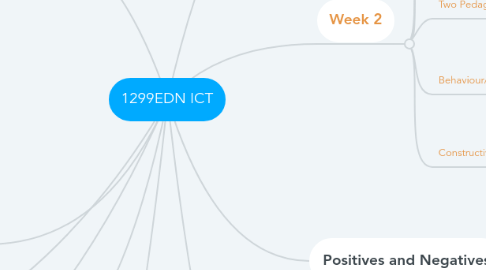
1. Focus on students who have specific learning needs.
2. 65% of jobs in the future are not currently existing. For example, five years ago instagram and youtube influencers were none existent.
3. Week 3
3.1. Choosing right tool for task and different ways we use technology.
3.2. Content specific: computer programs, games that present information incrementally with questions to be answered by the learner. Correct answers are rewarded.
3.3. Technology doesn't teach a conceptual understanding
3.4. Content specific tools are underpinned by behaviourist – cognitivist – views of learning
3.5. Learning is most effective when visible
3.6. Students use different types of technology to create/curate information
3.7. Enriching is collaborating with the students to
3.8. Content free software programs are blank/empty. Allowing students to add their knowledge or add information.
4. Cognitive Scaffolding Tool
4.1. Children are able to build connections and are able to have a better understanding
4.2. ICT Device in order for students to communicate and help each other.
4.2.1. Sufficient conversation for a better understanding on how the child is developing and their knowledge on the topic.
4.3. Scaffolding will also allow the student to understand the scaffold for each essay. For example; in a primary education scene you are able to get their thoughts down on paper.
5. Future in ICT
5.1. The Body of knowledge is doubled over the next 18 months.
6. Week 4
6.1. Assistive Technologies
6.2. Font, may be difficult to understand, time pressure or spelling errors.
6.2.1. Student Challenge:
6.3. As a teacher, we need to be able to remove barriers and acquire new information in a format that the student is able to engage with.
6.4. Special provisions do not involve compensating for what the student does not know or is unable to do.
6.5. Access Arrangements and reasonable
6.6. Involves the application of relevant syllabus criteria and standards against which achievement is judged.
6.6.1. Signing instead of seeking, computer simulation instead of laboratory work, specialised equipment, for example a keyboard rather than handwriting, digital reader to communicate a text where reading is not the skill being assessed, assistance with the interpretation and comprehension of assessment items that are not designed to assess those particular language skills, while also adding additional time for the student to complete the task.
7. Week 1
7.1. TPACK
7.2. Technological pedagogical and context knowledge
8. Week 2
8.1. Teacher Directed Learning
8.2. Asking Big, factual or yes/no questions
8.3. What question, as you can direct the use of ICT and pedagogy
8.3.1. Students must actively construct their own knowledge.
8.4. Two Pedagogies
8.4.1. Student directed learning
8.4.1.1. Teacher directed learning
8.4.2. Students work together and inquire about their own learning
8.4.2.1. Telling or asking students to research facts
8.5. Behaviour/Cognitivist
8.5.1. Knowledge exists external to the child and could be transmitted or received.Software: tutorial process. Pedagogy: direct instruction.
8.6. Constructivist
8.6.1. Construct reality from their perceptions construct their own knowledge. Software: show me app. Pedagogy: projects, big questions, investigations.
8.6.1.1. INVESTIGATE, COMMUNICATE + CREATE
9. Positives and Negatives
9.1. Positive
9.1.1. Future work
9.1.1.1. Interesting and engaging lessons
9.1.1.1.1. Creativity
9.2. Negative
9.2.1. Extremely expense
9.2.1.1. Internet issues, resulting in another expense having to get fixed.
9.2.1.1.1. Device issues, such as; broken screen, key pad, hacked.
